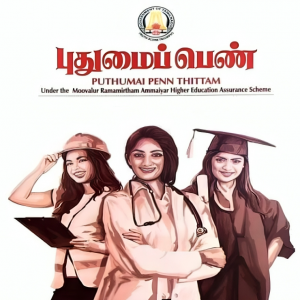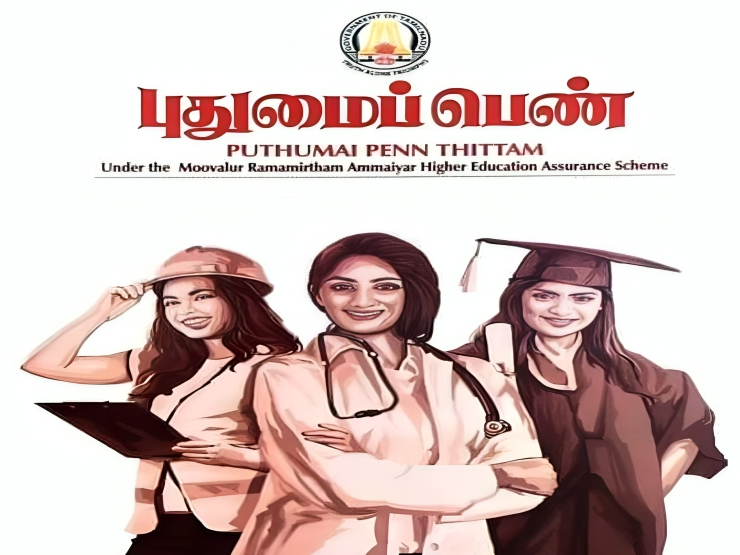

In India, where societal and economic barriers have historically hindered women's progress, education stands as the cornerstone of empowerment. The Tamil Nadu government's groundbreaking Pudhumai Penn Scheme exemplifies this transformative power, creating an ecosystem that fosters inclusivity and development for women, particularly those from marginalised communities. Recent evaluation data highlights the substantial progress made in promoting higher education among women and its cascading benefits for the state's socio-economic landscape.
Launched in late 2023, the Pudhumai Penn Scheme set out with a clear vision to enhance educational opportunities for girls, particularly in rural and underserved areas. The scheme's impressive reach extends to 5,095 educational institutions across eight districts, providing targeted financial aid to eligible female students. This proactive approach addresses multiple facets of inequality—economic, social, and geographic—that historically deterred young women from pursuing higher education.
The scheme's commitment to social equity is particularly evident in its demographic reach. Analysis reveals that 36.7% of beneficiaries come from Most Backward Classes (MBC), demonstrating the program's success in reaching historically disadvantaged groups. The balanced representation continues with 30.6% each from Backward Classes (BC) and Scheduled Castes (SC), while 1.3% belongs to Scheduled Tribes (ST). These statistics reflect a deliberate effort to ensure that educational opportunities reach those who most need them.
In 2023 alone, the scheme transformed the lives of 2,30,820 students (2.3 lakh), with each number representing a story of perseverance and ambition. For marginalised communities, where higher education for daughters often remains an unattainable dream due to financial constraints and entrenched social norms, the scheme serves as a crucial catalyst for change. The financial aid not only reduces the monetary burden on families but also empowers them to prioritise education over societal pressures such as early marriage.
The initiative's success stems from its structured and comprehensive approach. The program supports students across diverse academic streams, from traditional arts and sciences to emerging fields like computer science and professional courses. Key enrolment patterns show that the Bachelor of Commerce program is leading at 18.79%, followed by the Bachelor of Science program at 14.26%, with technical and vocational education gaining momentum at 9.7%. Significantly, 99.2% of beneficiaries from marginalised communities are enrolled in professional and socially relevant fields, including STEM disciplines, commerce, and social sciences. This diversification proves crucial in preparing Tamil Nadu's youth for an evolving job market, equipping them with skills essential for both traditional and modern industries.
The scheme's institutional reach demonstrates its commitment to accessibility. Government institutions lead with 45% of beneficiaries, followed by self-financing colleges (privately managed institutions) at 28% and aided colleges (private institutions receiving government support) at 22%. These figures reflect the program's success in making higher education a viable option for families who might otherwise consider it unattainable. The 13,681 new enrolments under this scheme in 2022 and 2023 underscore its role in breaking cycles of poverty and marginalisation.
The impact of Pudhumai Penn extends far beyond education statistics. Enabling women to pursue higher studies actively breaks the cycle of poverty and dependence. Education empowers women with knowledge, skills, and confidence, allowing them to make informed decisions about their lives and careers. This transformation manifests in the growing participation of women in the workforce, particularly in service-oriented and knowledge-driven sectors. For Scheduled Castes and Scheduled Tribes, historically denied access to education, the scheme opens doors to fields where their presence has traditionally been limited.
The scheme has fundamentally transformed societal attitudes toward women's education. In Tamil Nadu, a state already distinguished by its relatively high literacy rate, Pudhumai Penn reinforces the message that education is a fundamental right, not a privilege. Its success in normalising women's presence in higher education challenges deep-rooted stereotypes and establishes new social norms. Beyond academic outcomes, the scheme fosters a sense of belonging and aspiration among marginalised communities, creating a multiplier effect that leads to better health outcomes, enhanced family incomes, and greater community engagement.
However, the program faces significant challenges that require attention. While urban centres show high participation rates, rural and tribal areas continue to lag due to infrastructural and cultural barriers. The relatively low representation of Scheduled Tribes (1.3%) and other minorities (0.7%) highlights the need for more targeted outreach to these groups, particularly in areas where education infrastructure remains inadequate. Additional challenges include the lack of nearby colleges, affordable transportation, and persistent cultural resistance to women's education.
Bridging these gaps demands collaborative efforts between government agencies, local communities, NGOs, and private stakeholders. Moreover, the scheme must evolve beyond financial aid to create an ecosystem supporting holistic development through mentorship programs, career counselling, and skill development workshops. This comprehensive approach is essential for addressing the multifaceted barriers marginalised communities face.
Continuous monitoring and feedback remain crucial for the scheme's evolution. Current data indicates a preference for traditional courses, highlighting the need to encourage greater participation in STEM fields, which offer enhanced earning potential and broader societal impact. Regular evaluation helps identify such gaps and refine the program's approach, ensuring that it continues to meet the changing needs of its beneficiaries, particularly those from disadvantaged backgrounds.
The Pudhumai Penn Scheme represents Tamil Nadu's investment in its future—a future where education transcends gender and caste barriers, empowering every woman to shape her destiny. While the initial success is promising, sustained commitment from all stakeholders will be crucial in realising this vision of inclusive progress. The scheme's transformative potential in empowering young women from disadvantaged backgrounds cannot be overstated, leading to a more inclusive and equitable society.
By investing in women's education today, mainly focusing on marginalised communities, Tamil Nadu not only transforms individual lives but also builds the foundation for a more equitable and prosperous society tomorrow. The journey ahead requires persistent effort to address remaining challenges, particularly in reaching the most vulnerable communities. However, the groundwork laid by Pudhumai Penn provides a robust framework for continued progress toward educational equity and social justice.
The success of this scheme serves as a model for other states in India, demonstrating how targeted educational initiatives can effectively address deep-rooted social inequalities while promoting economic development. As the program continues to evolve and expand, its impact on marginalised communities will likely deepen, creating lasting change that spans generations.????????????????